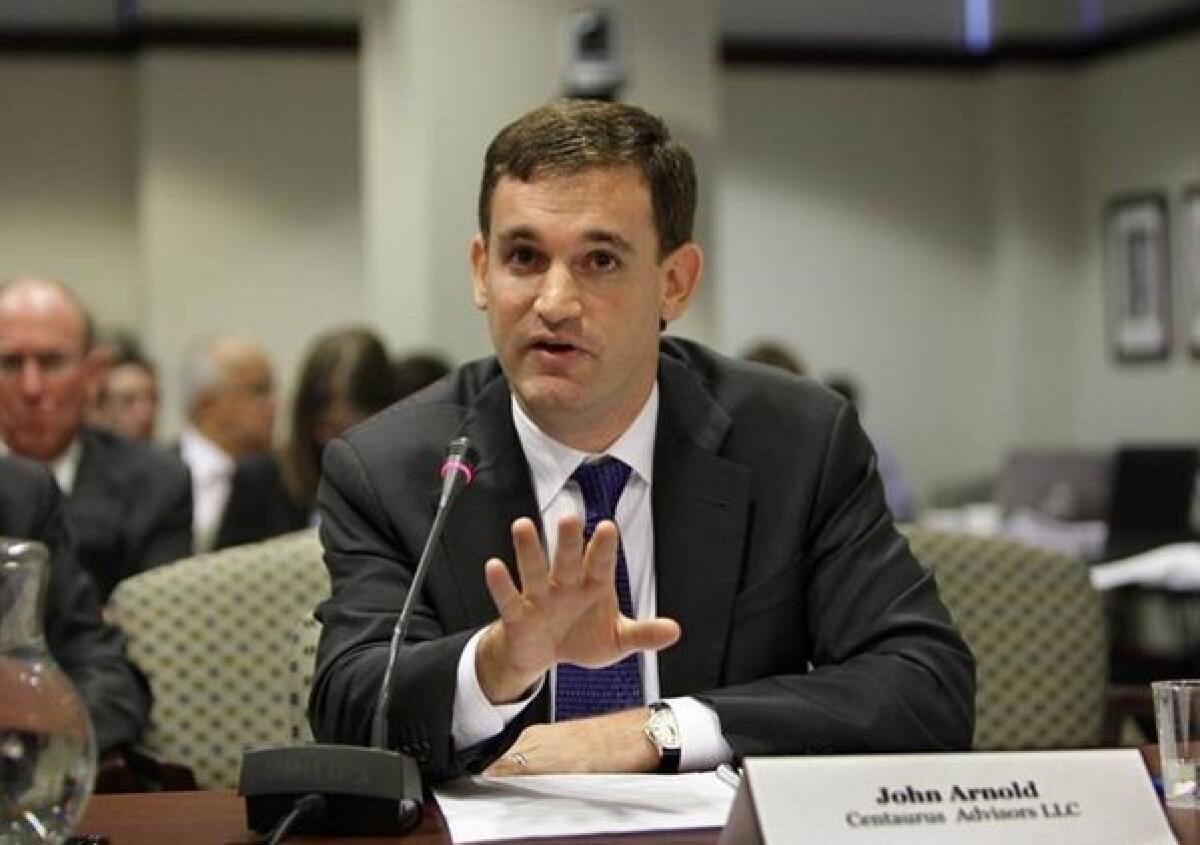First PBS, now Brookings: Has another institution sold its soul?

- Share via
The assiduous billionaire-tracker David Sirota, who last exposed the connections between billionaire John Arnold and a suspiciously one-sided series on public pension reform that ran on Public Broadcasting Service stations, is at it again.
Now he’s uncovered Arnold’s backing of a largely pro-”reform” report on public pensions issued by the Brookings Institution.
The paper, titled “Pension Politics,” analyzes the political efforts aimed at cutting public employee pensions in four states. Its author is Patrick McGuinn, a political scientist at Drew University in New Jersey, one of the states examined.
The paper discloses that support for its publication “was generously provided by the Laura and John Arnold Foundation” -- on its very last page. It doesn’t say how much support, but Sirota guesses that the money came from a $500,000 education grant the foundation made to Brookings in 2012.
Importantly, the Brookings paper “starts from the premise that the pension systems in many states have simply become unsustainable and that significant changes are necessary.” (It says so itself on Page 4.) It doesn’t delve much into that assumption, but sticks to the narrow topic of how the public campaigns to lessen the load by cutting those pensions were conducted. The “unsustainability” of public pensions is Arnold’s theme, too.
That’s not to say that the report entirely ignores the countervailing view, which is that the pension “crisis” has been overstated, often to serve the interests of Wall Street money managers -- it even cites in an endnote a blistering article on that theme by Matt Taibbi of Rolling Stone.
Brookings, moreover, insists that the Arnold Foundation had “no bearing or influence on the research itself or the conclusion of the research,” in the words of David Nassar, Brookings’ chief spokesman. He observes that Brookings is customarily supported by grants and gifts like the Arnolds’, and that all such funding is accepted “on the strictest understanding that Brookings will not sacrifice its commitment to independence and quality.”
McGuinn told us by email that his communication during the project was with Brookings, not the Arnold Foundation, and that he “conducted the research and interviews and reached my conclusions independently and Brookings did not try to influence these in any way.”
Still, there’s more to the links between Arnold and the report than its overall funding. The leader of the pension reform drive in Rhode Island was Democratic state Treasurer Gina Raimondo, whom the Brookings report lauds effusively for her efforts. The paper discloses that Raimondo’s reform organization, EngageRI, was financially supported by Arnold. What it doesn’t say is that Arnold is also helping to bankroll Raimondo’s campaign for governor. The sum so far, according to my old friend and colleague Katherine Gregg of the Providence Journal, is $100,000.
Nor does the Brookings paper disclose that another of its heroes, former Utah state Sen. Dan Liljenquist, has been a consultant for the Arnold Foundation on pension reform. Paid consultant, we assume. McGuinn says he didn’t include these relationships in his report because he wasn’t aware of them at the time.
Sirota argues that, through his donation, Arnold has co-opted an institution with a well-known reputation for middle-of-the-road judiciousness effectively to join a campaign with profound political implications -- and essentially on one side of the debate. What’s really needed in this debate, indeed, is a broader look at its underpinnings, which the Brookings report doesn’t provide. For a primer, you should start by consulting the work by Boston College’s Alicia Munnell and by the Center for Economic and Policy Research.
It may well be that the relationship between Brookings and the Arnold Foundation is fundamentally innocent. Yet there’s real peril for the health of public debate when one side of it is funded by someone with indisputably dominating resources. That’s been the danger in Pete Peterson’s campaigning against Social Security, which we’ve been reporting on for some time.
Arnold, who made his first money as an Enron energy trader during the period when the company was ruthlessly manipulating the California energy market, is cut from the Peterson cloth. He’s decided that public employee pensions are too much, and he’s spending millions to convince his fellow Americans of that viewpoint, facts or not. Any institution that accepts his money to research or report on the issue is allowing him to put his well-funded thumb on the scale.
More to Read
Sign up for Essential California
The most important California stories and recommendations in your inbox every morning.
You may occasionally receive promotional content from the Los Angeles Times.







